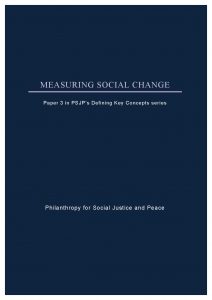 This is the third paper in PSJP’s Defining Key Concepts series and it looks at the concept of ‘measuring social change’ in development and philanthropy. (The first paper, published in October 2018, looked at the concept of ‘Dignity’ and the second, published in March 2019, looked at ‘Leadership’.)
This is the third paper in PSJP’s Defining Key Concepts series and it looks at the concept of ‘measuring social change’ in development and philanthropy. (The first paper, published in October 2018, looked at the concept of ‘Dignity’ and the second, published in March 2019, looked at ‘Leadership’.)
This paper draws on three webinar sessions held on the topic of ‘measuring change’ on 16 January 2019. In total, the webinars included 14 civil society practitioners from all over the world representing different kinds of civil society organization in different contexts, including CBOs, NGOs, INGOs, international funders, philanthropy networks and support organizations. During each session participants reflected on three open-ended questions:
- How do you measure social change in your organization? What works well and what are the challenges?
- Is there a difference between what you want to measure and what your funders think should be measured? If so, what are the main differences and how do you deal with this?
- Are there things you would ideally like to measure but can’t? What support would you like to address this?
The paper reveals a process-driven approach to measurement that aims to capture more nuanced ways of detecting outcomes where linear models are inappropriate. It highlights what the practitioners are seeking to measure, why they measure, how the measure ie their practices, behaviours and methodologies, and the challenges that they face. It also identifies their needs in order to further improve the measurement of social change.
Like the papers published before it, this paper is not definitive or comprehensive. PSJP’s aim is to gain greater understanding of these concepts within the field and to make them concrete and practical for practitioners. We therefore view this paper as work in progress, a starting point for discussion, and invite you to share your understanding and practice of measuring social change. We welcome your thoughts, which will be published as blogs or comments on the PSJP website.
This paper is based on research by Barry Knight and Chandrika Sahai for PSJP.
To comment or to take part in discussion on this topic, please write to chandrika@psjp.org